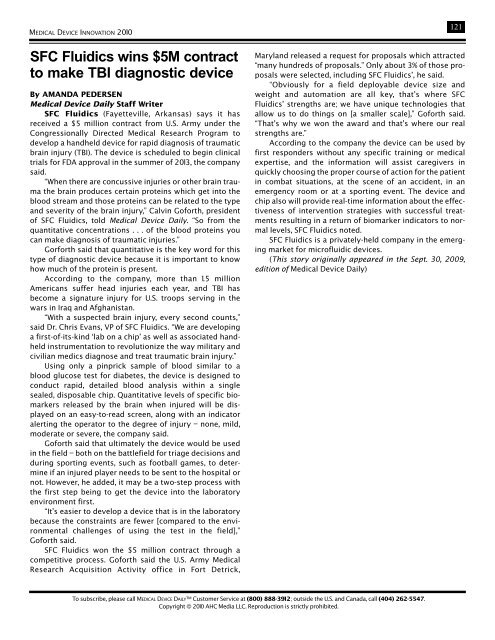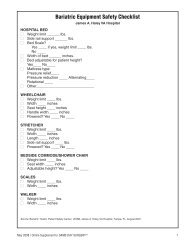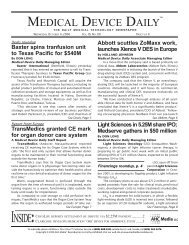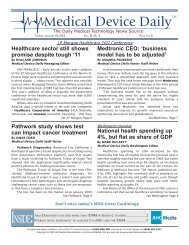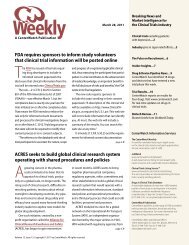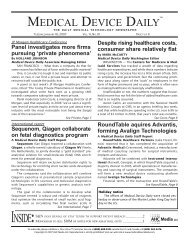MEDICAL DEVICE INNOVATION - Medical Device Daily
MEDICAL DEVICE INNOVATION - Medical Device Daily
MEDICAL DEVICE INNOVATION - Medical Device Daily
You also want an ePaper? Increase the reach of your titles
YUMPU automatically turns print PDFs into web optimized ePapers that Google loves.
<strong>MEDICAL</strong> <strong>DEVICE</strong> <strong>INNOVATION</strong> 2010<br />
SFC Fluidics wins $5M contract<br />
to make TBI diagnostic device<br />
By AMANDA PEDERSEN<br />
<strong>Medical</strong> <strong>Device</strong> <strong>Daily</strong> Staff Writer<br />
SFC Fluidics (Fayetteville, Arkansas) says it has<br />
received a $5 million contract from U.S. Army under the<br />
Congressionally Directed <strong>Medical</strong> Research Program to<br />
develop a handheld device for rapid diagnosis of traumatic<br />
brain injury (TBI). The device is scheduled to begin clinical<br />
trials for FDA approval in the summer of 2013, the company<br />
said.<br />
“When there are concussive injuries or other brain trauma<br />
the brain produces certain proteins which get into the<br />
blood stream and those proteins can be related to the type<br />
and severity of the brain injury,” Calvin Goforth, president<br />
of SFC Fluidics, told <strong>Medical</strong> <strong>Device</strong> <strong>Daily</strong>. “So from the<br />
quantitative concentrations . . . of the blood proteins you<br />
can make diagnosis of traumatic injuries.”<br />
Gorforth said that quantitative is the key word for this<br />
type of diagnostic device because it is important to know<br />
how much of the protein is present.<br />
According to the company, more than 1.5 million<br />
Americans suffer head injuries each year, and TBI has<br />
become a signature injury for U.S. troops serving in the<br />
wars in Iraq and Afghanistan.<br />
“With a suspected brain injury, every second counts,”<br />
said Dr. Chris Evans, VP of SFC Fluidics. “We are developing<br />
a first-of-its-kind ‘lab on a chip’ as well as associated handheld<br />
instrumentation to revolutionize the way military and<br />
civilian medics diagnose and treat traumatic brain injury.”<br />
Using only a pinprick sample of blood similar to a<br />
blood glucose test for diabetes, the device is designed to<br />
conduct rapid, detailed blood analysis within a single<br />
sealed, disposable chip. Quantitative levels of specific biomarkers<br />
released by the brain when injured will be displayed<br />
on an easy-to-read screen, along with an indicator<br />
alerting the operator to the degree of injury – none, mild,<br />
moderate or severe, the company said.<br />
Goforth said that ultimately the device would be used<br />
in the field – both on the battlefield for triage decisions and<br />
during sporting events, such as football games, to determine<br />
if an injured player needs to be sent to the hospital or<br />
not. However, he added, it may be a two-step process with<br />
the first step being to get the device into the laboratory<br />
environment first.<br />
“It’s easier to develop a device that is in the laboratory<br />
because the constraints are fewer [compared to the environmental<br />
challenges of using the test in the field],”<br />
Goforth said.<br />
SFC Fluidics won the $5 million contract through a<br />
competitive process. Goforth said the U.S. Army <strong>Medical</strong><br />
Research Acquisition Activity office in Fort Detrick,<br />
121<br />
Maryland released a request for proposals which attracted<br />
“many hundreds of proposals.” Only about 3% of those proposals<br />
were selected, including SFC Fluidics’, he said.<br />
“Obviously for a field deployable device size and<br />
weight and automation are all key, that’s where SFC<br />
Fluidics’ strengths are; we have unique technologies that<br />
allow us to do things on [a smaller scale],” Goforth said.<br />
“That’s why we won the award and that’s where our real<br />
strengths are.”<br />
According to the company the device can be used by<br />
first responders without any specific training or medical<br />
expertise, and the information will assist caregivers in<br />
quickly choosing the proper course of action for the patient<br />
in combat situations, at the scene of an accident, in an<br />
emergency room or at a sporting event. The device and<br />
chip also will provide real-time information about the effectiveness<br />
of intervention strategies with successful treatments<br />
resulting in a return of biomarker indicators to normal<br />
levels, SFC Fluidics noted.<br />
SFC Fluidics is a privately-held company in the emerging<br />
market for microfluidic devices.<br />
(This story originally appeared in the Sept. 30, 2009,<br />
edition of <strong>Medical</strong> <strong>Device</strong> <strong>Daily</strong>)<br />
To subscribe, please call <strong>MEDICAL</strong> <strong>DEVICE</strong> DAILY Customer Service at (800) 888-3912; outside the U.S. and Canada, call (404) 262-5547.<br />
Copyright © 2010 AHC Media LLC. Reproduction is strictly prohibited.


